The approval was based on the positive results from ROSEWOOD Phase 2 study in which Brukinsa plus the obinutuzumab achieved higher overall response rate compared to obinutuzumab alone

A micrograph of follicular lymphoma. (Credit: Nephron/Wikimedia Commons)
BeiGene has secured marketing authorisation from the European Commission (EC) for Brukinsa (zanubrutinib) to treat relapsed or refractory (R/R) follicular lymphoma (FL).
Brukinsa is a small molecule inhibitor of Bruton’s tyrosine kinase (BTK). It is designed to deliver complete and sustained inhibition of the BTK protein.
EC has approved Brukinsa, the fourth indication in the European Union (EU), in combination with Obinutuzumab for adult patients with R/R FL who were administered with at least two prior lines of systemic therapy.
The approval was based on the positive results from the ROSEWOOD Phase 2 study of Brukinsa plus obinutuzumab against obinutuzumab only in 217 patients.
According to the results, the overall response rate was 69.0% in the Brukinsa plus obinutuzumab arm.
The rate was noted at 45.8% in the obinutuzumab arm, with a median follow-up of around 20 months.
In addition, the responses were durable with an 18-month landmark duration of response (DOR) of 69.3% in the Brukinsa combo arm.
Furthermore, BRUKINSA plus Obinutuzumab-treated patients showed 28.0 months of median progression-free survival (PFS) for patients compared to 10.4 months for patients treated with only Obinutuzumab.
Both medicines were generally well-tolerated, with safety results similar to data from previous studies of both drugs.
BeiGene Hematology chief medical officer Mehrdad Mobasher said: “With this approval, we are excited to announce that Brukinsa will become available as a treatment option for patients with follicular lymphoma in the European Union.
“Brukinsa is now the first BTK inhibitor approved in this indication and has the broadest label of any medicine in its class globally.
“This milestone marks a significant advancement in our efforts to combat the disease by providing a new and effective treatment option to patients who have either failed to respond to initial therapies or have experienced a relapse.”
In the EU, the BTK inhibitor is approved as monotherapy for the treatment of adult patients with chronic lymphocytic leukaemia.
For R/R FL, the drug is currently under review by health regulatory authorities in the US and China.
